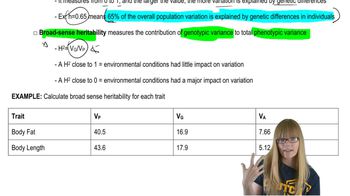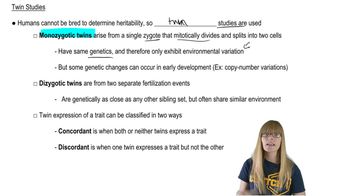Table of contents
- 1. Introduction to Genetics51m
- 2. Mendel's Laws of Inheritance3h 37m
- 3. Extensions to Mendelian Inheritance2h 41m
- 4. Genetic Mapping and Linkage2h 28m
- 5. Genetics of Bacteria and Viruses1h 21m
- 6. Chromosomal Variation1h 48m
- 7. DNA and Chromosome Structure56m
- 8. DNA Replication1h 10m
- 9. Mitosis and Meiosis1h 34m
- 10. Transcription1h 0m
- 11. Translation58m
- 12. Gene Regulation in Prokaryotes1h 19m
- 13. Gene Regulation in Eukaryotes44m
- 14. Genetic Control of Development44m
- 15. Genomes and Genomics1h 50m
- 16. Transposable Elements47m
- 17. Mutation, Repair, and Recombination1h 6m
- 18. Molecular Genetic Tools19m
- 19. Cancer Genetics29m
- 20. Quantitative Genetics1h 26m
- 21. Population Genetics50m
- 22. Evolutionary Genetics29m
20. Quantitative Genetics
Heritability
Problem 25a
Textbook Question
Textbook QuestionIn human gestational development, abnormalities of the closure of the lower part of the mid-face can result in cleft lip, if the lip alone is affected by the closure defect, or in cleft lip and palate (the roof of the mouth), if the closure defect is more extensive. Cleft lip and cleft lip with cleft palate are multifactorial disorders that are threshold traits. A family with a history of either condition has a significantly increased chance of a recurrence of mid-face cleft disorder in comparison with families without such a history. However, the recurrence risk of a mid-face cleft disorder is higher in families with a history of cleft lip with cleft palate than in families with a history of cleft lip alone. Suppose a friend of yours who has not taken genetics asks you to explain these observations. Construct a genetic explanation for the increased recurrence risk of mid-face clefting in families that have a history of cleft disorders versus families without a history of such disorders.
 Verified Solution
Verified SolutionThis video solution was recommended by our tutors as helpful for the problem above
Video duration:
2mPlay a video:
206
views
Was this helpful?



